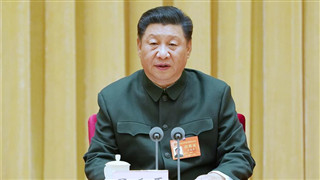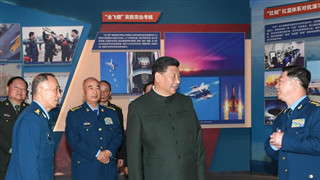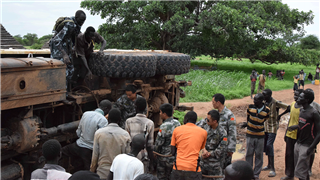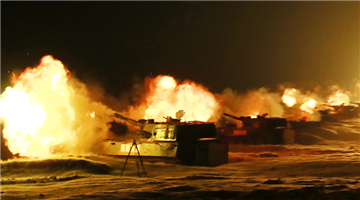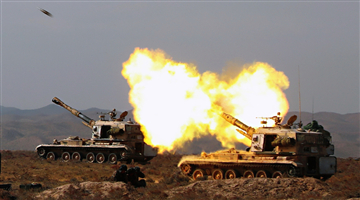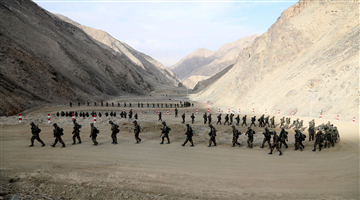By Song Yunxia
Iran has started the process of injecting uranium gas into over 1,000 centrifuges at its underground Fordow nuclear plant, the latest move of the fourth phase after it stopped fulfilling the nuclear deal. Previously, Iran continued to break through the uranium abundance limit, from 3.67% to 4.5% to 5.4%, in order to counter the US “extreme pressure”. At a time when the current tension in the Gulf is escalating, whether the US and Iran can "avoid imminent disaster" and where the Iranian nuclear agreement will go will remain the focus of attention of the international community.
The “breakthrough” of the nuclear agreement by Iran at this time has sparked different reactions from the international community. Russia defended Iran, saying that Iran was forced to make this move and still exercised restraint. The US has continued its consistent policy of "big stick" lashed out at Iran. The EU kicked the ball back to Iran, saying that the EU is still committed to maintaining the Iranian nuclear deal. However, the EU's commitment "depends on whether Iran fully implements the agreement", showing that Europe is helpless as the US withdrew from the agreement.
The current status of the Iranian nuclear issue is closely tied with the US arbitrarily pulling out from the agreement and imposing “extreme pressure” on Iran, as well as the Europe’s inability to do anything about it.
After the US announced its unilateral withdrawal from the Iranian nuclear agreement in May 2018, it continued to increase its “extreme pressure” on Iran, imposed a "zero exemption" blockade on Iranian oil exports, and repeatedly increased its military presence in the Middle East to deal with the so-called “Irani threat” and issued serial rounds of sanctions against Iran. The US also used the attack on the Saudi oil field to promote the formation of the regional International Maritime Security Construct (IMSC) to achieve its strategic intention of containing Iran.
The US has recently been addicted to imposing sanctions. The US State Department recently extended the sanctions against Iran to Iran’s construction industry and trading on some nuclear-related materials. The US Department of the Treasury followed and announced the sanctions against nine people closely related to Iran’s supreme leader Ali Khamenei and the General Staff Department of the Iranian Armed Forces.
As a stakeholder, European countries are very worried. After all, the Iranian nuclear deal is hard-won and also the best solution that all parties have reached so far to solve the Iranian nuclear issue. Therefore, European leaders unanimously claimed to “ensure that the Iranian nuclear agreement will continue to be fulfilled” after the US withdrawal.
To this end, the UK, France and Germany established a special mechanism for trading with Iran, the Instrument in Support of Trade Exchanges (INSTEX). This payment mechanism is equivalent to a barter system, which runs outside the US-led global financial system, being able to help European companies to circumvent US unilateral sanctions against Iran and provide part of the economic dividends promised by the agreement. However, the US threatened to sanction other companies that have trades with Iran in the form of “long arm jurisdiction”, the settlement mechanism became a “car without gas”, making it difficult for European countries to make progress in terms of fulfillment.
In order to counter against the extreme pressure from the US, and seek revenge against Europe’s “lip service”, Iran has continued to take "small tentative steps" to break through the agreement. In other words, the sanctions had a serious impact on the Iranian economy, and Iran, which was forced into the corner, had to find a way to break through.
However, Iran has a “route of retreat” while continuing to take “small tentative steps”. Iran stated that its actions are reversible. As long as the other parties fulfill their respective commitments and safeguard its interests, it will “embrace” the Iranian nuclear deal again. Iran is very aware of the serious consequences of crossing the “nuclear threshold” and will not easily break the ban on “producing enriched uranium with more than 20% of abundance”. Moreover, Iran’s Supreme Leader Ali Khamenei said in a speech that although Iran has the capability to develop nuclear weapons, it will not do so. According to Iran’s official media, the Islamic Republic News Agency, Khamenei stated that the development of nuclear weapons is not in accordance with Sharia.
It is not difficult to find that while Iran is flexing its muscle, it still repeatedly expresses the willingness to stay in the Iranian nuclear deal. Its actions are still controllable and reversible, and the main intention is to urge Europe to take concrete actions. For the Trump administration, which has always advocated the withdrawal of troops from overseas and is facing pressure from presidential elections, the announcement of additional sanctions against Iran just proves that Trump does not want to take military actions against Iran. After all, keeping the situation tumultuous in the region is beneficial to the US, while a large-scale hot war is not. Therefore, the future “interaction” between the US and Iran and the fate of the Iranian nuclear deal remain to be seen.
(The author is from the PLA Dalian Naval Academy)
